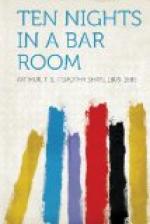“But ain’t you afraid to go on in this way? Don’t you know where it will all end?”
“Just as well as anybody. It will make an end of me or—of all that is good in me. Rum and ruin, you know, sir. They go together like twin brothers.”
“Why don’t you get out of the way of temptation?” said I.
“It’s easy enough to ask that question, sir; but how am I to get out of the way of temptation? Where shall I go, and not find a bar in my road, and somebody to say—’Come, Sam, let’s take a drink’? It can’t be done, sir, nohow. I’m a hostler, and I don’t know how to be anything else.”
“Can’t you work on a farm?”
“Yes; I can do something in that way. But, when there are taverns and bar-rooms, as many as three or four in every mile all over the country, how are you to keep clear of them? Figure me out that.”
“I think you’d better vote on the Maine Law side at next election,” said I.
“Faith, and I did it last time!” replied the man, with a brightening face—“and if I’m spared, I’ll go the same ticket next year.”
“What do you think of the Law?” I asked.
“Think of it! Bless your heart! if I was a praying man, which I’m sorry to say I ain’t—my mother was a pious woman, sir”—his voice fell and slightly trembled—“if I was a praying man, sir, I’d pray, night and morning, and twenty times every day of my life, for God to put it into the hearts of the people to give us that Law. I’d have some hope then. But I haven’t much as it is. There’s no use in trying to let liquor alone.”
“Do many drinking men think as you do?”
“I can count up a dozen or two myself. It isn’t the drinking men who are so much opposed to the Maine Law as your politicians. They throw dust in the people’s eyes about it, and make a great many, who know nothing at all of the evils of drinking in themselves, believe some bugbear story about trampling on the rights of I don’t know who, nor they either. As for rum-sellers’ rights, I never could see any right they had to get rich by ruining poor devils such as I am. I think, though, that we have some right to be protected against them.”
The ringing of a bell here announced the arrival of some traveler, and the hostler left me.
I learned, during the morning, that Matthew, the bar-keeper, and also the son of Mr. Slade, were both considerably hurt during the affrays in the bar-room, and were confined, temporarily, to their beds. Mrs. Slade still continued in a distressing and dangerous state. Judge Lyman, though shockingly injured, was not thought to be in a critical condition.
A busy day the sheriff had of it, making arrests of various parties engaged in the last night’s affairs. Even Slade, unable as he was to lift his head from his pillow, was required to give heavy bail for his appearance at court. Happily, I escaped the inconvenience of being held to appear as a witness, and early in the afternoon had the satisfaction of finding myself rapidly borne away in the stage-coach. It was two years before I entered the pleasant village of Cedarville again.




